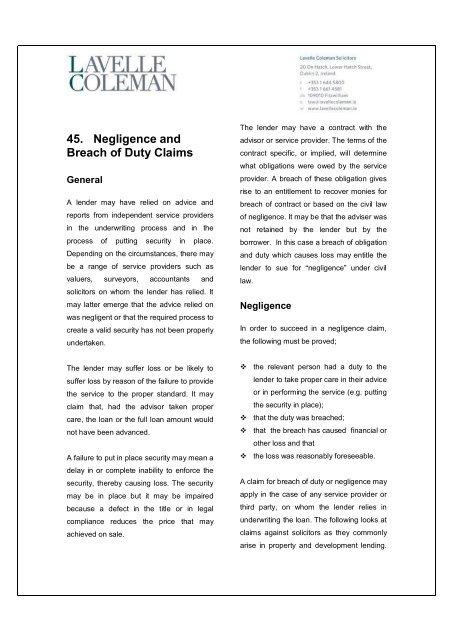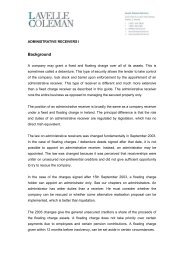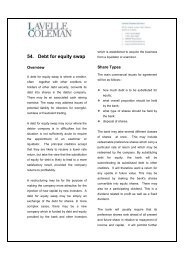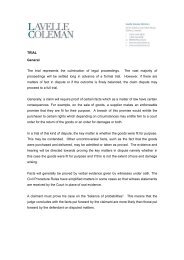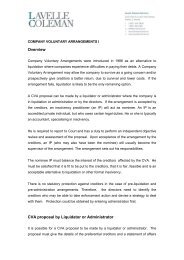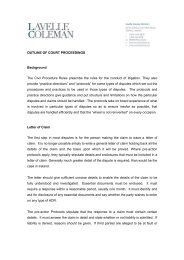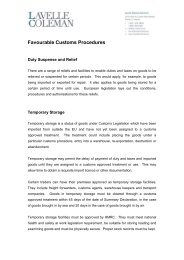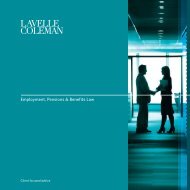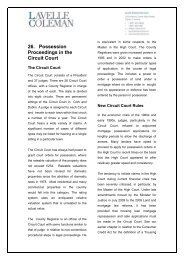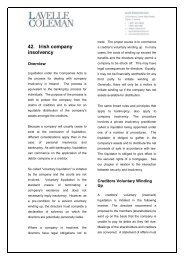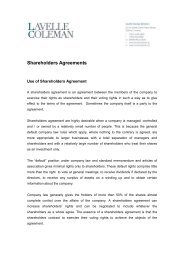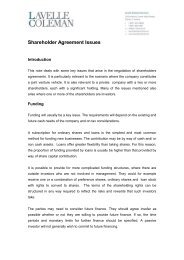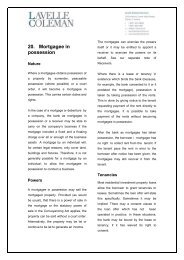45. Negligence and Breach of Duty Claims - Lavelle Coleman
45. Negligence and Breach of Duty Claims - Lavelle Coleman
45. Negligence and Breach of Duty Claims - Lavelle Coleman
Create successful ePaper yourself
Turn your PDF publications into a flip-book with our unique Google optimized e-Paper software.
<strong>45.</strong> <strong>Negligence</strong> <strong>and</strong><br />
<strong>Breach</strong> <strong>of</strong> <strong>Duty</strong> <strong>Claims</strong><br />
General<br />
A lender may have relied on advice <strong>and</strong><br />
reports from independent service providers<br />
in the underwriting process <strong>and</strong> in the<br />
process <strong>of</strong> putting security in place.<br />
Depending on the circumstances, there may<br />
be a range <strong>of</strong> service providers such as<br />
valuers, surveyors, accountants <strong>and</strong><br />
solicitors on whom the lender has relied. It<br />
may latter emerge that the advice relied on<br />
was negligent or that the required process to<br />
create a valid security has not been properly<br />
undertaken.<br />
The lender may have a contract with the<br />
advisor or service provider. The terms <strong>of</strong> the<br />
contract specific, or implied, will determine<br />
what obligations were owed by the service<br />
provider. A breach <strong>of</strong> these obligation gives<br />
rise to an entitlement to recover monies for<br />
breach <strong>of</strong> contract or based on the civil law<br />
<strong>of</strong> negligence. It may be that the adviser was<br />
not retained by the lender but by the<br />
borrower. In this case a breach <strong>of</strong> obligation<br />
<strong>and</strong> duty which causes loss may entitle the<br />
lender to sue for negligence under civil<br />
law.<br />
<strong>Negligence</strong><br />
In order to succeed in a negligence claim,<br />
the following must be proved;<br />
The lender may suffer loss or be likely to<br />
suffer loss by reason <strong>of</strong> the failure to provide<br />
the service to the proper st<strong>and</strong>ard. It may<br />
claim that, had the advisor taken proper<br />
care, the loan or the full loan amount would<br />
not have been advanced.<br />
A failure to put in place security may mean a<br />
delay in or complete inability to enforce the<br />
security, thereby causing loss. The security<br />
may be in place but it may be impaired<br />
because a defect in the title or in legal<br />
compliance reduces the price that may<br />
achieved on sale.<br />
v the relevant person had a duty to the<br />
lender to take proper care in their advice<br />
or in performing the service (e.g. putting<br />
the security in place);<br />
v that the duty was breached;<br />
v that the breach has caused financial or<br />
other loss <strong>and</strong> that<br />
v the loss was reasonably foreseeable.<br />
A claim for breach <strong>of</strong> duty or negligence may<br />
apply in the case <strong>of</strong> any service provider or<br />
third party, on whom the lender relies in<br />
underwriting the loan. The following looks at<br />
claims against solicitors as they commonly<br />
arise in property <strong>and</strong> development lending.
The same broad principles apply in relation<br />
to the borrowers accountants, valuers, tax<br />
advisers, surveyors <strong>and</strong> other parties on<br />
whom the lender relies in advancing loan<br />
monies as well as equivalent service<br />
providers that the lender has itself engaged.<br />
Where a solicitor provides services for a<br />
client, there will generally be a contract or<br />
retainer agreement setting out the terms<br />
under which services are provided. Solicitors<br />
must issue an engagement letter to clients<br />
setting out the terms on which services are<br />
provided.<br />
circumstances where things go wrong<br />
notwithst<strong>and</strong>ing that the solicitor acted with<br />
due care <strong>and</strong> skill. In these cases, there is<br />
no liability.<br />
A solicitor will generally be liable if he failed<br />
to exercise the due care <strong>and</strong> skill that a<br />
reasonably competent solicitor in that area<br />
<strong>of</strong> work would have undertaken. However, a<br />
solicitor can be liable in negligence, even if<br />
he follows st<strong>and</strong>ard practice. If the st<strong>and</strong>ard<br />
practice contains an obvious risk (even in<br />
hindsight) then the solicitor may be held<br />
liable.<br />
The solicitors letter <strong>of</strong> engagement will<br />
specify the scope <strong>of</strong> the solicitors<br />
responsibilities. It may not specify the<br />
st<strong>and</strong>ard <strong>of</strong> performance in which case, it<br />
will be implied that the solicitor must perform<br />
the services with due care <strong>and</strong> skill.<br />
Even if there is no contract between a<br />
solicitor <strong>and</strong> client, the solicitor may be liable<br />
for negligent work or advice in accordance<br />
with the above principles. A solicitor may be<br />
liable to a person who is not a client, if he<br />
knew or should have known that person was<br />
likely to rely on his advice or on his work.<br />
A solicitor is obliged to take due care in<br />
relation to his services <strong>and</strong> advice. He is not<br />
an insurer in this sense <strong>and</strong> does not have<br />
absolute responsibility. There may be many<br />
Other Duties<br />
Some obligations undertaken by solicitor are<br />
unconditional. This depends on how they<br />
are worded. Certain parts <strong>of</strong> a certificate <strong>of</strong><br />
title <strong>and</strong> undertakings involve unconditional<br />
obligations, rather than an obligation to use<br />
due care <strong>and</strong> skill. In these cases the<br />
solicitor guarantees a particular result or<br />
position, rather than agreeing to use due<br />
care <strong>and</strong> skill to do so. For example,<br />
undertakings regarding h<strong>and</strong>ing <strong>of</strong> loan<br />
monies etc. are unconditional.<br />
A solicitor owes so-called fiduciary duties<br />
to clients. This is a duty to act in good faith<br />
<strong>and</strong> to disclose <strong>and</strong> avoid conflicts <strong>of</strong><br />
interest. A fiduciary duty involves stricter<br />
duties than in the case <strong>of</strong> other pr<strong>of</strong>essional
services. A solicitor may only act for both the<br />
bank <strong>and</strong> borrower if there is no potential<br />
conflict <strong>of</strong> interest or if the conflict is fully<br />
disclosed <strong>and</strong> both consent to the solicitor<br />
acting. Under the st<strong>and</strong>ard Law Society<br />
Certificate <strong>of</strong> title, the bank is not the<br />
solicitors client.<br />
Basis <strong>of</strong> Liability<br />
The cases illustrate the courts approach to<br />
cases where the lender alleges it would not<br />
have lent or would have lent less, but for<br />
valuers negligence or the failure <strong>of</strong> a<br />
solicitor to disclose some material defect or<br />
matter. The cases indicate that there were<br />
three scenarios:<br />
v the lender would not have lent if it had<br />
been known the true position. In this<br />
case, the valuer <strong>and</strong>/or solicitor is<br />
potentially liable for the entire loss<br />
subject to issues <strong>of</strong> contributory<br />
negligence <strong>and</strong> the lenders obligation to<br />
mitigate.<br />
v the lender would have been unwilling to<br />
lend the same amount, if it had known<br />
the true position. In this case, the valuer<br />
<strong>and</strong>/or solicitor may be liable for a<br />
maximum <strong>of</strong> the difference between the<br />
amount lent <strong>and</strong> the amount if would<br />
have lent, had it known the true position.<br />
v The lender would have entered the<br />
transaction anyway had it known the<br />
true position. In this, there is no liability<br />
because they have caused no loss.<br />
The retainer agreement/contract will define<br />
the liability in relation to the services<br />
concerned. Liability may be limited by the<br />
term <strong>of</strong> the agreement. In the case <strong>of</strong> some<br />
advisors, the relevant pr<strong>of</strong>essional rules may<br />
restrict the extent to which liability may be<br />
limited. An advisor may be liable to a client<br />
both for breach <strong>of</strong> contract <strong>and</strong> for<br />
negligence. If the contract validly limits the<br />
level <strong>of</strong> liability, this cannot be circumvented<br />
by claiming for negligence.<br />
A lender may be guilty <strong>of</strong> contributory<br />
negligence by failure to make its own<br />
enquiries <strong>and</strong> ignoring obvious risks <strong>of</strong><br />
which it was aware. The lender may be<br />
familiar with the market <strong>and</strong> may be aware<br />
<strong>of</strong> partcular practices. If it is equally aware or<br />
should have been aware <strong>of</strong> the risks, a court<br />
may decide that the solicitors or valuers<br />
negligence did cause the loss.<br />
Alternatively, the court may decide that the<br />
lender is partly responsible or guilty <strong>of</strong><br />
contributory negligent <strong>and</strong> that accordingly,<br />
its entitlement to compensation should be<br />
reduced.<br />
Regulation <strong>of</strong> Solicitors<br />
Solicitors are regulated by the Incorporated
Law Society <strong>of</strong> Irel<strong>and</strong>. Every solicitor must<br />
hold a Practising Certificate, which must be<br />
renewed annually. There are rules <strong>of</strong><br />
conduct <strong>and</strong> ethics which regulate the<br />
manner in which solicitors must deal with<br />
their clients <strong>and</strong> third-parties. A solicitor can<br />
be investigated by the Law Society <strong>and</strong> is<br />
subject to sanction by way <strong>of</strong> fine, censure,<br />
suspension or strike <strong>of</strong>f for failure to comply<br />
with the requisite rules <strong>and</strong> st<strong>and</strong>ards.<br />
Undertakings<br />
Solicitors undertakings are unconditionally<br />
binding on solicitors. They are enforced as a<br />
disciplinary matter as well as by a court<br />
claim for damages for loss for by reason <strong>of</strong><br />
compliance. Undertakings are generally<br />
absolute <strong>and</strong> unconditional. They are not<br />
just an obligation to use best endeavours to<br />
comply. Any ambiguity in an undertaking is<br />
interpreted in favour <strong>of</strong> the person to whom<br />
it is given. There is a special summary court<br />
procedure for enforcement <strong>of</strong> undertakings.<br />
Solicitors undertakings are a critical part <strong>of</strong><br />
the procedure for putting security in place. In<br />
residential investment <strong>and</strong> owner occupier<br />
mortgage cases, security is generally put in<br />
place by the borrowers solicitor under the<br />
Law Society's st<strong>and</strong>ard undertakings <strong>and</strong><br />
certificate <strong>of</strong> title. See our separate chapter<br />
on the st<strong>and</strong>ard form <strong>of</strong> undertakings <strong>and</strong><br />
certificates.<br />
An undertaking by a solicitor to do a<br />
particular thing, is<br />
unconditionally binding<br />
on the solicitor. It is enforceable in normal<br />
legal proceedings in the same manner as<br />
other civil obligations or debts. An<br />
undertaking can also be enforced summarily<br />
i.e. by a procedure which involves direct<br />
application to the High Court. As part <strong>of</strong> this<br />
power, the court has power to make a<br />
summary order for compensation.<br />
An undertaking can also be enforced in<br />
personal disciplinary procedures against the<br />
solicitor by the Law Society <strong>and</strong> ultimately<br />
by the High Court. This is initiated by a<br />
complaint can be made to the Law Society<br />
which polices the solicitors pr<strong>of</strong>ession.<br />
Compensation for <strong>Breach</strong> <strong>of</strong><br />
Undertaking<br />
A recent case has reaffirmed the inherent<br />
power <strong>of</strong> the High Court to enforce<br />
undertakings against solicitors. It confirms<br />
the power to grant compensation for breach<br />
<strong>of</strong> undertaking. The power is both a punitive<br />
<strong>and</strong> compensatory jurisdiction. It is<br />
discretionary <strong>and</strong> each case to be<br />
considered on its own facts <strong>and</strong><br />
circumstances.<br />
The court is concerned to uphold the<br />
integrity <strong>of</strong> the system, <strong>and</strong> the highest
st<strong>and</strong>ards <strong>of</strong> honourable behaviour by its<br />
solicitors, a st<strong>and</strong>ard higher than that<br />
required by law generally. The order made<br />
by the court can take whatever form best<br />
serves the interests <strong>of</strong> justice between the<br />
parties.<br />
The court must consider the entire<br />
undertaking in order to reach a conclusion<br />
as to its real ultimate purpose. The court<br />
may order compliance with the undertaking,<br />
though late, where there remains a<br />
reasonable possibility <strong>of</strong> so doing. Even<br />
where the undertaking may still be complied<br />
with, the court may nevertheless order the<br />
solicitor to make good any loss actually<br />
occasioned by the breach <strong>of</strong> undertaking,<br />
which may or may not be the entire <strong>of</strong> the<br />
sum which was the subject <strong>of</strong> the<br />
undertaking.<br />
Where compliance is not possible to achieve<br />
by the time the court is deciding what order<br />
to make, if any, it may order the solicitor to<br />
make good any loss actually occasioned by<br />
the breach <strong>of</strong> undertaking. Carelessness or<br />
other form <strong>of</strong> negligence on the part <strong>of</strong> the<br />
person affected by the undertaking, <strong>and</strong> in<br />
relation to the matter the subject there<strong>of</strong>,<br />
may be a factor which the court will have<br />
regard to when determining what order may<br />
be fair <strong>and</strong> just.<br />
Any order the court may make ought not be<br />
oppressive on the solicitor. Nevertheless,<br />
gross carelessness or other conduct<br />
considered sufficiently egregious by the<br />
court, though falling short <strong>of</strong> criminal<br />
behaviour or even pr<strong>of</strong>essional misconduct,<br />
will entitle the court, should it consider it just<br />
to do so, to order payment <strong>of</strong> the entire sum<br />
which was the subject <strong>of</strong> the undertaking,<br />
<strong>and</strong> not simply a lesser sum in respect <strong>of</strong><br />
loss actually occasioned by the breach <strong>of</strong><br />
undertaking.<br />
Complaints<br />
A complaint may be made to the Law<br />
Society by a client only, subject to limited<br />
exceptions. There is a five-year time limit. A<br />
complaint may be made about misconduct,<br />
including breach <strong>of</strong> undertaking. The<br />
complaint should first be put to the solicitor.<br />
The Law Society appoints an investigating<br />
solicitor who investigates the complaint <strong>and</strong><br />
asks both solicitor <strong>and</strong> complainant for their<br />
observations. He may require the solicitor to<br />
take action to remedy the matter concerned.<br />
If this does not resolve the matter, it is<br />
referred to the Complaints <strong>and</strong> Client<br />
Relations Committee.<br />
The Complaints <strong>and</strong> Client Relations<br />
Committee may interview the solicitor. It<br />
makes a formal decision to either uphold or<br />
reject the complaint. It can direct the solicitor<br />
to take such steps as it requires as a result
<strong>of</strong> their decision. It can direct compensation<br />
payment not exceeding 3,000.<br />
The complaint may be referred to an<br />
independent adjudicator, who can revisit the<br />
file. Alternatively, the matter can be sent<br />
directly to the Solicitors Disciplinary<br />
Tribunal. The Disciplinary Tribunal<br />
investigates allegations <strong>of</strong> misconduct<br />
against solicitors. A complaint can be<br />
referred directly to the Tribunal or can be<br />
referred by the Complaints <strong>and</strong> Client<br />
Relations Committee.<br />
If the Disciplinary Tribunal considers the<br />
misconduct to be sufficiently serious so as<br />
not appropriate for the exercise <strong>of</strong> the above<br />
sanctions, it may report to the High Court.<br />
The High Court has an inherent jurisdiction<br />
over solicitors. In referring to the High Court,<br />
the Disciplinary Tribunal must form an<br />
opinion as to the fitness <strong>of</strong> the solicitor to<br />
practice <strong>and</strong> recommend sanctions. The<br />
High Court may strike <strong>of</strong>f solicitor, suspend<br />
practice, limit practice, restrict practice or<br />
censure or fine the solicitor.<br />
conditions <strong>of</strong> insurance cover. The rules<br />
were revised in 2008 to provide revised<br />
minimum terms'.<br />
Under the minimum terms, the insurer may<br />
not disclaim liability under the policy by<br />
reason <strong>of</strong> non-disclosure <strong>of</strong> material risks,<br />
misrepresentation <strong>and</strong> even fraud. This<br />
changes the utmost good faith principle<br />
which usually means that an insurer can<br />
avoid an insurance policy, if all material facts<br />
are not disclosed. The insurer must cover<br />
the risk even where the matter concerned<br />
was deliberately withheld at the renewal <strong>of</strong><br />
the policy.<br />
There is a proposal at present (September<br />
2009) to further amend the minimum terms<br />
for the next insurance period (commencing<br />
December 2009) on account the difficulty<br />
that the new minimum terms have caused in<br />
procuring insurance for some practitioners<br />
at a reasonable cost. There is also a<br />
proposal to exclude cover for certain types<br />
<strong>of</strong> solicitors undertakings in commercial<br />
property loans.<br />
Pr<strong>of</strong>essional Liability Insurance<br />
Every solicitor must maintain pr<strong>of</strong>essional<br />
indemnity insurance at a level <strong>of</strong> no less<br />
than 2,500,000 per claim as a precondition<br />
to obtaining an annual practising certificate.<br />
The rules lay down minimum terms <strong>and</strong><br />
The Law Society has created the assigned<br />
risks pool for solicitors who cannot obtain<br />
insurance cover in the open market at a<br />
reasonable cost. Once in the pool, the<br />
solicitor is subject to Law Society<br />
supervision <strong>and</strong> must undergo a risk<br />
management assessment <strong>and</strong> audit. There
is a limited time during which a firm may<br />
remain in the assigned risks pool. If they<br />
cannot obtain insurance in the open market<br />
after this period, they cannot continue to<br />
practise as sole traders.<br />
All commercial insurers must participate in<br />
the assigned risks pool <strong>and</strong> carry a<br />
proportion <strong>of</strong> its risks. If a solicitor is<br />
discharged from the assigned risks pool, he<br />
may no longer continue to practise unless<br />
he obtains insurance in the open market<br />
once again.<br />
A solicitor is obliged to notify an insurer in<br />
writing <strong>of</strong> any a possible claim once it comes<br />
to his attention. This also applies to a<br />
circumstance which may give rise to a<br />
possible claim. Once notified the<br />
circumstance will be dealt with under the<br />
policy in force when notified, irrespective <strong>of</strong><br />
when the claim is made.<br />
The Law Society keeps a record <strong>of</strong><br />
insurance cover, which is available for<br />
inspection. This gives details <strong>of</strong> solicitors<br />
<strong>and</strong> the qualified insurer<br />
When a solicitor ceases to practice he must<br />
maintain run <strong>of</strong>f insurance for a period <strong>of</strong><br />
six years from the end <strong>of</strong> his last year he<br />
ceases to practice. This is designed to cover<br />
subsequently notified claims. Retirement is<br />
sometimes dealt with by extending cover <strong>of</strong><br />
the remaining partners to cover retired<br />
partners or employee for liability arising from<br />
pre-retirement work.<br />
Insurance <strong>Claims</strong><br />
Solicitors pr<strong>of</strong>essional liability insurance is<br />
on a claims made basis. This means that<br />
there must be a policy in force when the<br />
claim is made or when the circumstance<br />
that might give rise to the claim is notified.<br />
The insurance covers the solicitor's practice<br />
as a solicitor rather his personal activities.<br />
The insurer usually conducts the legal action<br />
on behalf <strong>of</strong> the solicitor. It will appoint its<br />
own solicitor <strong>and</strong> will be entitled to make the<br />
key decisions in relation to the conduct <strong>of</strong><br />
litigation.<br />
Compensation Fund<br />
The Solicitors Compensation Fund is<br />
financed by contributions by each solicitor. A<br />
person seeking a grant from the fund must<br />
apply within three months <strong>of</strong> the matter<br />
concerned coming to his attention. The<br />
purpose <strong>of</strong> the fund is to ensure that a<br />
person who suffers loss due to a solicitor's<br />
dishonesty is not left without a remedy. The<br />
person may be required to seek recovery <strong>of</strong><br />
monies through all other available means<br />
(e.g. by a negligence claim) first.
The Law Society has a discretion in making<br />
grants from the fund. The grounds are that<br />
a client <strong>of</strong> a solicitor has sustained loss in<br />
consequence <strong>of</strong> the dishonesty on a<br />
solicitors part or on the part <strong>of</strong> its employee.<br />
The loss must be suffered by a client <strong>and</strong><br />
not a third-party. The fund does not cover<br />
the losses arising from a solicitors personal<br />
dealings. It must arise from practice as a<br />
solicitor.<br />
Where a payment is made, the Law Society<br />
is entitled to subrogation in respect <strong>of</strong> the<br />
payments. This means that it is entitle to<br />
exercise the rights <strong>of</strong> the person it has<br />
compensated to recover the sum paid from<br />
a third party against whom the third party<br />
might himself complain.<br />
Legal Services Ombudsman<br />
The recently established Legal Services<br />
Ombudsman reviews decisions <strong>of</strong> the Law<br />
Society in h<strong>and</strong>ling complaints. It also<br />
reviews decisions in relation to payments<br />
from the compensation fund.<br />
This is an extract from our “Legal Guide to the<br />
Management <strong>and</strong> Enforcement <strong>of</strong> Security in<br />
Irel<strong>and</strong>” (2009). The Guide is intended as an<br />
overview <strong>and</strong> broad outline <strong>of</strong> the matters<br />
covered in it. Its purpose is to inform <strong>and</strong> raise<br />
awareness. We are happy to <strong>of</strong>fer specific legal<br />
advice on particular circumstances. It should not<br />
be relied on as a substitute for comprehensive<br />
legal advice with reference to the particular<br />
circumstances. While we have taken due care in<br />
the preparation <strong>of</strong> this publication, we do not<br />
accept legal liability as a result <strong>of</strong> any reliance<br />
placed on anything in it. The reader should rely<br />
only on specific legal or taxation advice. This<br />
extract is based on the law as <strong>of</strong> 1 st<br />
2009.<br />
© Paul McMahon, <strong>Lavelle</strong> <strong>Coleman</strong> 2009<br />
CONTACTS<br />
Paul McMahon<br />
October<br />
pmcmahon@lavellecoleman.ie<br />
Phone: (353) 1 6445800<br />
Fax: (353) 1 6614581<br />
<strong>Lavelle</strong> <strong>Coleman</strong><br />
Solicitors<br />
20 On Hatch<br />
Lower Hatch Street<br />
Dublin 2<br />
Irel<strong>and</strong><br />
www.lavellecoleman.ie


